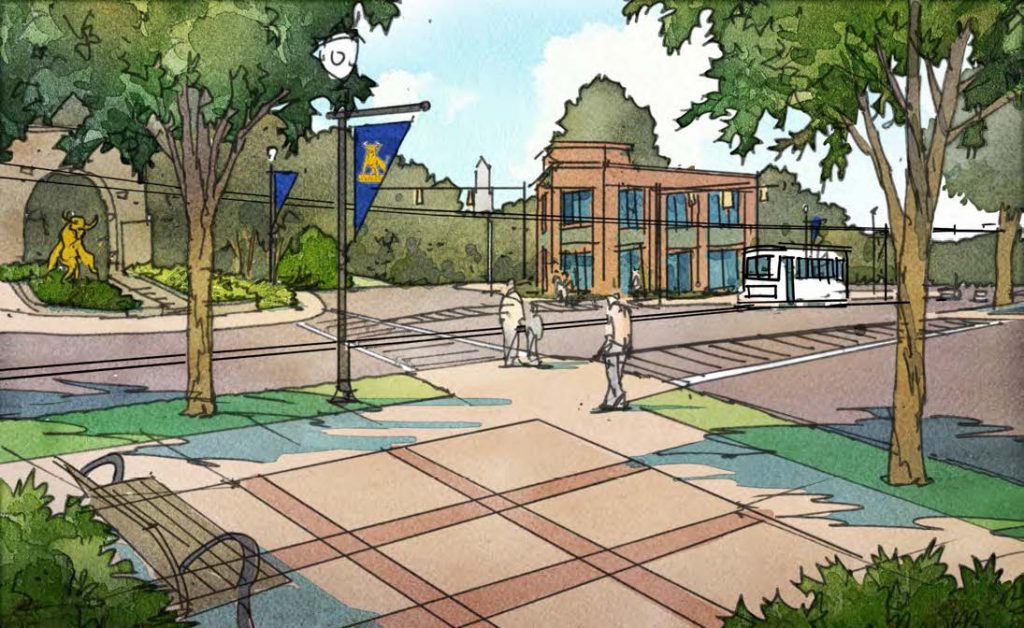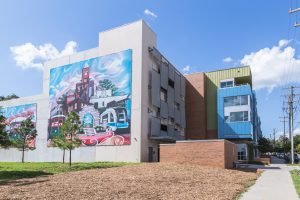
Charlotte’s West End is among the oldest and most culturally rich areas of the city. With neighborhoods dating back to the late 1800’s, this area has served as a hub for the African-American community for generations. From long standing community service organizations to educational institutions such as Johnson C. Smith University to more than 330 acres of greenspace, there is a strong community built on Charlotte’s west side and many people invested in its future.

For all the positives, many issues remain. High unemployment, low income and educational achievement as well the need for additional housing units and retail space are issues that longtime residents know well.
“I can remember growing up in this neighborhood. We had a lot of amenities we could walk to… We had a grocery store, a drug store. We had cleaners. I know what we have now is a lot of neighborhoods… but what I want most of all is for us to be a community again,” said resident Dorothy Counts-Scoggins.
These factors have made the West End, specifically the West Trade/Rozzelles Ferry area, one of six communities selected for the City of Charlotte to make strategic investments through its Comprehensive Neighborhood Improvement Program (CNIP).

CNIP is a program within the city’s Community Investment Plan, a long-range capital investment program designed to keep pace with a rapidly expanding population, replacing aging infrastructure and improving quality of life.
The program addresses significant infrastructure deficiencies within established neighborhoods, providing support for a well-connected network of streets, sidewalks, greenways and bike lanes that promote better connections between neighborhoods and major employment, institutional and retail areas.
While community engagement is not a new component to the process for selecting projects, CNIP was developed with the idea that city staff could make a more conscious effort to engage residents as early as possible to identify how they want to see their communities grow. CNIP is built on the principle that the city can build streets, but it takes residents to build a community.
Throughout the CNIP planning process, area residents readily and enthusiastically became a crucial part of enhancing their community. The project team worked closely with land owners, business owners, neighborhoods and City and County agencies to determine what they need in their communities and what projects would act as a catalyst for transformation.
Instead of starting with potential projects to be evaluated, the project team started with history of the area. They reviewed previous city area plans and studies, interviewed key stakeholders, engaged local agencies and neighborhood organizations, performed an in-depth market analysis and held more than 60 public engagements and reached over 470 individual participants.
This holistic approach to community engagement also allowed project staff to utilize more inclusive techniques to gather community input. A community learning workshop was held where more than 100 participants were asked to select their top three priorities from the six CNIP goals. Attendees were also asked to provide specific recommendations on infrastructure improvements. The team also held a three-day charrette where members of the community worked with the project team to identify key opportunities and locations for building new infrastructure and attracting additional investment to the West End.
The culmination of this work resulted in the identification and prioritization of 23 individual projects that are seen as the most transformative for the community, encouraging additional investment from project partners and stimulating new developments. Projects range from realigning streets to building a community transit center to improving pedestrian crossings.
An additional 29 projects were also identified for future consideration and another 18 that although outside of the CNIP scope are opportunities to improve the West Trade/Rozzelles Ferry Area.
For a complete list of the projects selected view the West Trade/Rozzelles Ferry Playbook.
Community engagement activities will continue throughout the individual project implementation. Leading with people first, CNIP hopes to play a part in rejuvenating the community feel the West End was built on.
West Trade CNIP Team:
Lamar Davis, Project Manager, Engineering & Property Management
Randy Harris, Community Engagement Team Leader, Neighborhood & Business Services
Debbie Smith, Assistant Division Manager, Charlotte Department of Transportation
Alberto Gonzalez, Senior Principal Planner, Charlotte-Mecklenburg Planning Department
Veronica Wallace, Planning & Design Program Manager, Engineering & Property Management
Thanks, Sabrina, for this encouraging report. It does sound like much more of listening and building a partnership with leaders and regular ol’ folk in the West End.
Could we hear from some of the stakeholders interviewed? What worked as part of the CNIP outreach? What could be done better or differently? Nice to hear Dorothy Counts-Scoggin’s thoughts, but might be nice to hear from others, too.
Is this experience being applied for other neighborhoods in Charlotte? I see five other areas listed as part of CNIP’s work – http://charlottenc.gov/charlottefuture/CIP/CNIP/Pages/default.aspx
How does the CNIP relate to Charlotte Center City Partners’ work on “branding and boosting” the Historic West End? https://www.charlotteagenda.com/47735/ideas-boost-charlottes-west-end/
Unsurprisingly, this report on the Charlotte Center City Partners’ work focuses more on redevelopment and economic dimensions, rather than strengthening a community in other ways.
Thanks, John Stephens – UNC-CH
John, thank you for the comment.
Additional stakeholder interviews are available in the West Trade/ Rozzelles Ferry Playbook (http://charlottenc.gov/charlottefuture/CIP/CNIP/Pages/WestTrade.aspx) along with greater detail about the team’s outreach efforts overall.
Each of the five CNIP areas took a similar approach, tailored to the history and character of their area. All projects were evaluated against the same goals and vetted within their respective communities.
The city also works closely with community partners to ensure as much alignment as possible with proposed projects. Two of CNIP’s consultants, AECOM and Stantec, will also be working with Center City Partners as it relates to their branding, way finding and place making on various projects including the W. Trade Gateway/I-77 Underpass Enhancement and Five Points Plaza.
The project team is glad to talk further.